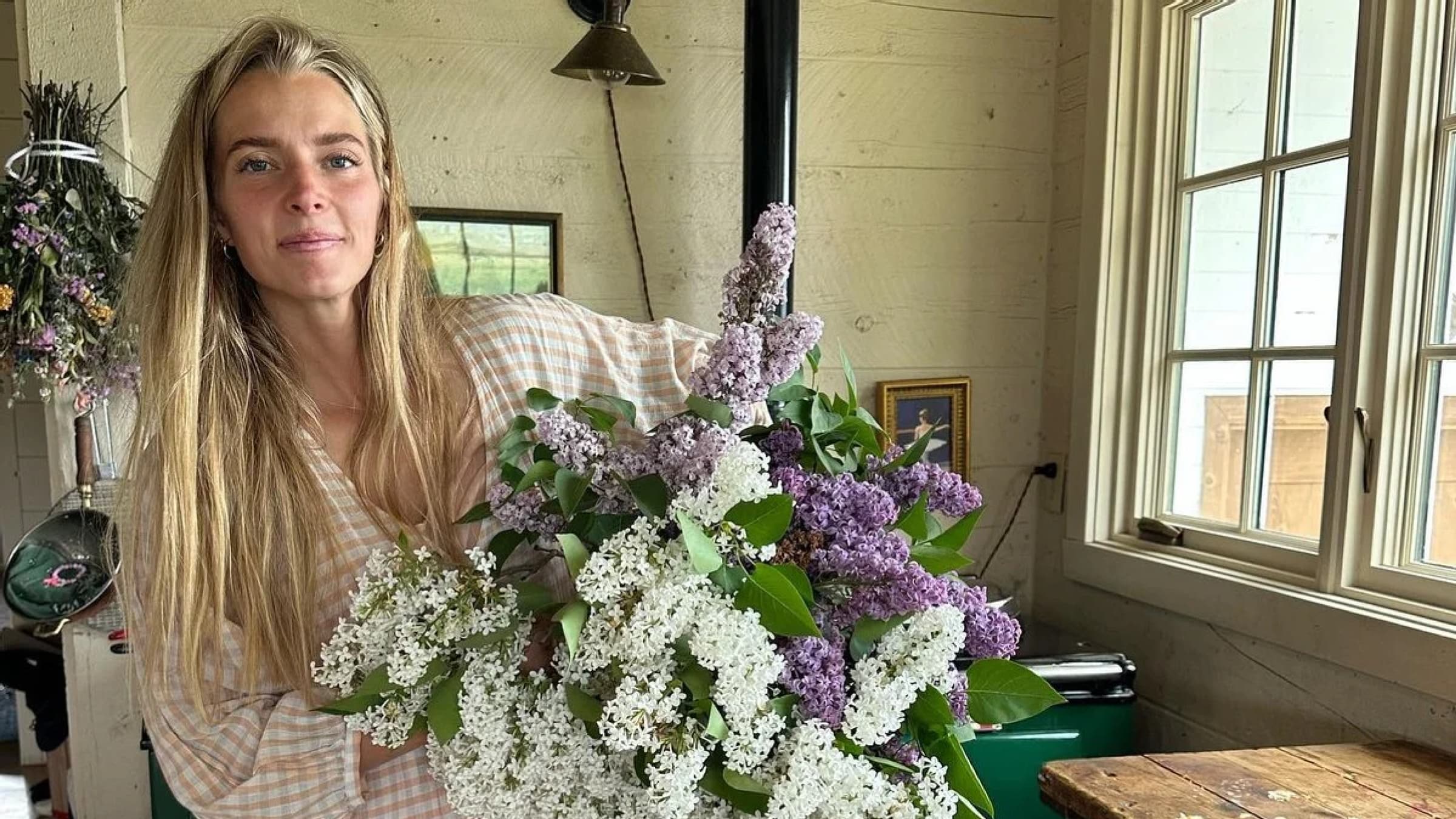Meet the influencers repackaging the Mormon dream

Nara Smith is everywhere. You do have to interact with the right kind of content for her to pop up on your feed, but her “perfect” life makes that no hard feat. Her content – foremost on TikTok – sees the model, wife and mum of three flounce around her immaculately clean, largely cream-coloured house, cook huge, elaborate meals for her husband and kids, and… Not much else. And that’s okay: though it’s going to be a frustrating watch for the average joe for whom her lifestyle is a sheer impossibility, her content is harmless. She’s just another “lifestyle influencer”. That was the case, anyway. Recently, Nara’s been making the rounds not for her enviable existence, but because people found out she’s a Mormon.
“i’m sorry but i just can’t see nara smith the same after i find out that she is a mormon [sic]” read one tweet. It should be said that it’s not like Nara has not gone to much effort to hide her Mormonism. The wife of fellow model Lucky Blue Smith – who recently shared that he’s “challenged [himself] to read the Book of Mormon from cover to cover” – her content is sprinkled with subtle mentions of her religion. There’s her “morning scriptures” and in one video she even laments on how “crazy” it is that viewers “assume that they know what [she] believes in”. Nevertheless, the Mormon credentials of Nara’s video were enough for some people to start spinning the narrative that the model-turned-influencer was a form of propaganda for the religion. In one of the most viral tweets from the Nara discourse on X, professor Uju Anya even stipulated that Nara’s content was the same as regressive images from the 1950s.
It’s not clear to what extent those purporting this conspiracy actually believed it to be true. Were they envisaging money being exchanged and hush-hush conversations taking place at Temple? Or did they believe Nara’s endorsement of the Mormon church was more of a happy accident? The answer depends on which X user you ask. And though their takes might sound like baseless hysteria, they’re not just plucking the idea of Mormon propaganda out of thin air. What’s been dubbed the Bloggernacle – which journalist Emily Matchar wrote about in an article titled “Why I Can’t Stop Reading Mormon Housewife Blogs” – is a community of Mormon bloggers that use their online presence to describe their idyllic day-to-day, and in turn spread their teachings. During a radio interview, prominent Mormon influence Stephanie Nielson even said that she felt her readers were reaching the spirit of God through her writings… Some may call that propaganda.
Really, though, it doesn’t matter: propaganda or not, Nara’s content does have the desired effect. “its funny how people say stuff like nara smith doesn’t make me wanna be a mormon and then in the same breath say she just makes me wanna cook for my husband 24/7 [sic]” said one user. “I cant wait to get my life financially stable to always be presentable even to cook, must feel lovely!” reads another comment on a video of Nara making fresh cinnamon rolls for her husband.
Still, it wouldn’t be unfounded to suggest that the Mormon church is suffering the kind of fall from grace that might necessitate a helping hand in the PR department. The religious group – which is, in the simplest of terms, a very community oriented sect of Christianity – has long attracted controversy for it’s regressive policies around abstinence and same-sex marriage. Recently, however, it’s gotten far worse. The US reality show The Real Housewives of Salt Lake City has catapulted Mormonism into the cultural imagination and birthed results that aren’t always the most flattering. Housewife Heather Gay spends a decent portion of her airtime talking about why she decided to leave the Mormon church, citing not just her perpetual mental health struggles during her four decades as a loyal member, but the sexual harassment she faced at the hands of Mormon bishops as a teen.
Elsewhere, it’s the (former) Mormon influencers that are doing their bit to unpick the squeaky clean Mormon image. In early 2023, it was influencer Taylor Paul that became the unfortunate face of Mormonism when she went against the religious doctrine of chastity and admitted she’d partaken in some “soft-swinging”. Things came to a head in February 2023 when she was arrested for domestic violence. Last summer, Mormon-related news took the form of Ruby Franke, the Mormon mommy blogger who was recently charged with six counts of aggravated child abuse. Basically, if push comes to shove, we can see why the Mormons might need someone like Nara. While hordes of viewers are tuning in to see influencers like her bake a loaf of bread, there’s all those praying for their downfall: a Reddit page called “r/taylorpauldrama” has a huge 24,000 followers. And the one dedicated to Ruby Franke – “r/8passengersnark – has 43,000. Some even believe that Nara’s presence is a desperate attempt by the Mormon church to ameliorate the racist underpinnings of their teachings. That is, until fairly recently the Latter Day Saints taught that they “shall be a white and a delightsome people”.
At the end of the day, it’s still a whole lot of “ifs”. But regardless of her religious stance, Nara’s videos do tap one of the major issues inherent to this type of content: namely, there’s a glaring divide between the “simplicity” of her lifestyle and the means that make it possible. And there’s no better illustration of this contradiction than Hannah Neeleman of Ballerina Farm: a polarising figure within the realm of lifestyle content, her online presence has raised eyebrows because of the stark contrast between the simplicity she advocates for and the undisclosed financial backing that enables it. The mother of eight – who recently made headlines for competing in a pageant just two weeks after she gave birth – shares videos of her life on her Utah farm. While she, like Nara, sprinkles in allusions to her Mormon faith, what she leaves off the table is that her husband is the son of David Neeleman, who founded five airlines including JetBlue. “7 kids and has time to make home made mozzarella [raising hands emoji]” reads the top comment on a video of Hannah making meatballs, sourdough baguettes and mozzarella entirely from scratch. She puts across, to put simply, a kind of Edenic lifestyle, her viewers lapsing over the accumulation of wealth necessary to not just spend her time idly cooking, but have that number of kids to feed in the first place. In reality, the majority of women are being priced out of motherhood.
It’s tempting to unify Nara, Hannah, and all the aforementioned Mormon-fluencers with the umbrella term of a “trad wife”. Unfortunately, it’s an all too binary label: with pockets of the movement associated with the alt-right and white nationalism, they’re that one step further than the Mormon influencers. And it’s Nara and Hannah’s place in this mysterious grey area – one where you can’t see the wood for the trees when it comes to their regressive ideologies – that makes them so insidious, yet simultaneously so palatable.
And while we might be saying it through gritted teeth, credit’s due where credit’s due. For some, Nara should be praised for carving out her own place in a sphere previously dominated by white women. And if we do give both Nara and Hannah something, it’s that their content is a kind of remedy to the consumption-driven lifestyles of other influencers. But it also takes a kind of wilful blindness to truly believe that. Nara does the majority of her “humble” cooking in designer gowns and is no stranger to popping to the local mall for a spending spree. And the “simple life” of Hannah? It’s down to that sweet JetBlue money… Anyway, we’ve got to go and make some cinnamon rolls.

